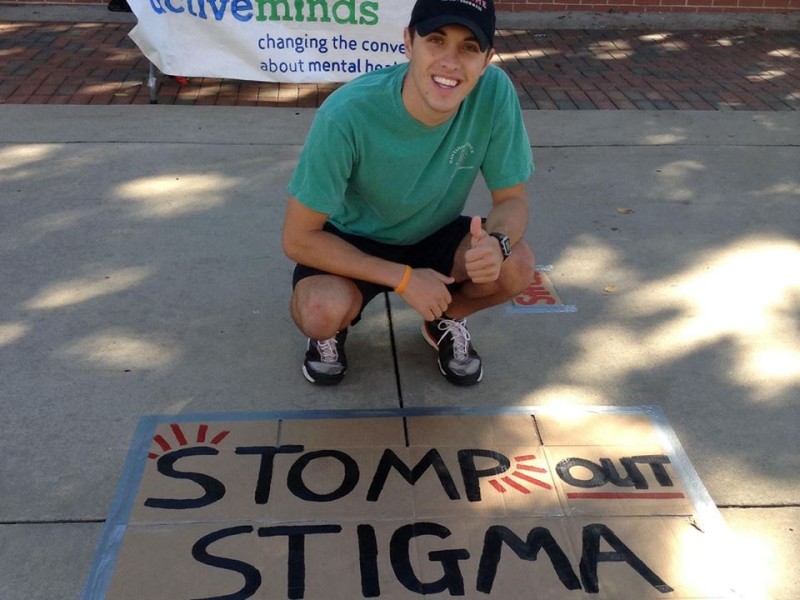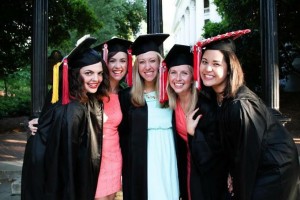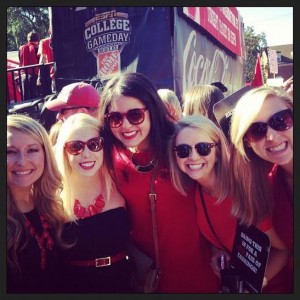I was born in Baton Rouge, Louisiana, during the turbulent Civil Rights Movement in 1968, the year which epitomized the era with the assassinations of Dr. Martin Luther King Jr. and Bobby Kennedy. The Red Stick has always been a catalyst for change, even if she was often times an unintentional participate.
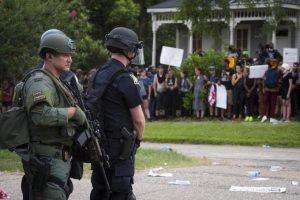
Peaceful protesters overshadowed by armed militants.
The Baton Rouge I grew up in is not the same that I see today. My childhood in Baton Rouge was idyllic in that it was filled with all the treasures that children hold dear.
We existed in a microcosm that afforded exposure to the arts, sports, culture, and a rich heritage because we grew up in the shadows of a historic black college.
So, when I think of Baton Rouge, I think of Southern University, Dixie cups, Tabby’s Blues Box, the Ann Theater, Tony’s Seafood, debutante balls, Mardi Gras, Park Vista, the Scotlandville Branch of the East Baton Rouge Public Library, Ethel’s Snack Shack, teacakes, football, Ryan Elementary, family, and home.
To others it conjures up visions of Mike the Tiger, Highland Road, the LSU lakes, and all things south Baton Rouge.
Yet, I have always known that Baton Rouge, despite her greatness and location at the mouth of the mighty Mississippi, has been a mistress of sorts because of NOLA.
My Baton Rouge has always been in the thick of things, even if unwittingly.
On June 19, 1953, the African-American residents of Baton Rouge launched a historic bus boycott because black people were forced to sit in the back of the bus, even when the front of the bus was empty. It became known as the 1953 Baton Rouge Bus Boycott.
The demands for black riders to ride in the front of the bus, but still refrain from sitting next to whites, was supported by the City Council initially and it led to the passing of Ordinance 222.
However, the all-white fleet of bus drivers refused to enforce the ordinance and it was later overturned after the drivers went on strike. The bus drivers’ strike lasted four days. The drivers returned to work after the ordinance was overturned and declared victory.
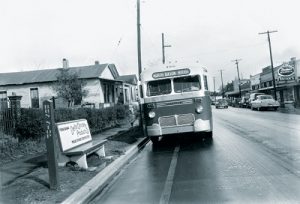
1953 Baton Rouge Bus Boycott
However, a local minister, Rev. T. J. Jemison, had a call to conscious and he helped organize the United Defense League and a boycott in a response to the decision to overturn the ordinance by the Louisiana Attorney General.
Residents met in four mass meetings and raised $6,000 in just two days. About 14,000 of residents refused to board the city’s buses and instead received rides in free taxis and in private cars. About 125 private cars were used in the boycott.
The boycott ended six days after it began with Ordinance 251.
Black riders filled the bus from the rear forward and whites filled the bus from the front to the back. Blacks and whites were still prohibited from sitting next to each other.
Two front seats were off-limits to black riders and only black riders could occupy the wide rear seat in the back of the bus. Blacks made up about 80 percent of the ridership, so the boycott had an economic impact on the city’s transportation system and on the broader Civil Rights Movement.
The fight for social justice in sleepy Baton Rouge in 1953, including the free car ride system that was implemented during bus boycott, served as a model for the internationally known 1955 Montgomery Bus Boycott.
This resulted in Browder v. Gayle, the U.S. District Court case on Montgomery and Alabama state bus segregation laws, which ultimately resulted in a U.S. Supreme Court decision declaring Alabama and Montgomery laws require segregated buses be unconstitutional.
The 1953 Baton Rouge Bus boycott also inspired residents to mobilize around other issues, such as securing the right to vote.
So, Baton Rouge is no novice to civil rights movements or protests. She has long shined the light on disturbing inequities by forcing others to explore racial disparities.
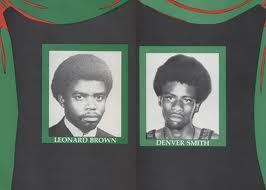
Victims, Leonard Brown and Denver Smith
As a college student at Southern University, Baton Rouge, in the ’80s, I was all too familiar with protesting and its often heartbreaking cost.
I still remember when – nearly 46 years ago – Denver Smith and Leonard Brown, two African-American students from my alma mater, were killed on campus by white sheriff deputies during a peaceful protest on November 16, 1972.
The two victims were taking part in a peaceful, unarmed protest by African-American students who gathered at the university’s administration building to protest against the administration officials and their policies. Protests were ongoing as students fought for a greater voice in school affairs and the resignation of certain administrators.
Several student protesters had been arrested the previous night, and the students who entered the administration building on November 16 sought their release.
State police and sheriff’s deputies entered the administration building with firearms and tear gas. When they left, two students, Denver Smith and Leonard Brown, lay dead.
Louisiana’s governor, Edwin Edwards, ordered the campus closed and declared a state of emergency for Baton Rouge, claiming that these “militant” students posed a threat.
National Guard troops and police wearing riot gear patrolled Southern University. The deputies denied shooting the young men.
Governor Edwards said the fatal shots might have accidentally come from the deputies’ guns, or might have come from any of several other sources: “It is obvious there are discrepancies and questions…In the heat of that kind of situation, even if someone accidentally took a buckshot shell out of his pocket, loaded it, and shot it, he would not be able to tell himself afterwards whether he had done it.”
Edwards ordered an investigation, but the shooter or shooters were never identified. The official report by State Attorney General William Guste determined that the shots came from a sheriff’s deputy but it could not prove which deputy fired the shot. Guste recommended that the District Attorney consider criminal prosecution after the investigating committee concluded no students had firearms, tear gas, grenades, or other weapons.
After over four decades, no one has been tried or convicted for the murder. The victims’ families tried to file several lawsuits, but they were unsuccessful. Lawyers in town would not talk to the families and those that did were run out of town.
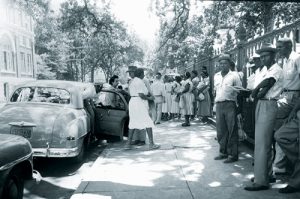
Nevertheless, over 40 years later, the legacy of Smith and Brown continues to live on.
When the old Administration Building was destroyed in a fire in 1991, a memorial stone was placed on campus near the spot where the students were shot.
I can remember being terribly disappointed as a third grader to learn that former Governor Edwards had not done more for these victims.
It was especially troubling because as a St. Anthony Elementary School first grader, Edwards had selected me to read a book with him in the rotunda of the state capital and so I always had deep admiration and respect for him.
There was no justice for these students, but the Smith-Brown Memorial Union honors them. During my matriculation at the university, it’s now the gathering place for many students to challenge the administration and to speak out against injustice on campus and in our community.
So, civil unrest and protest is nothing new in Baton Rouge. Nor is she new to being a catalyst for change.
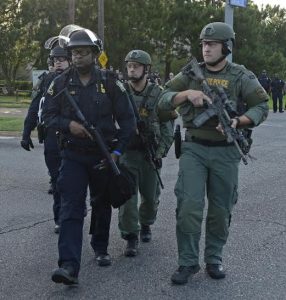
Baton Rouge offers a considerable number of economic strengths and assets. Baton Rouge is a major center for higher education. Southern University, Louisiana State University, Baton Rouge Community College, and multiple trade schools are all located in the City-Parish, graduating 5,000 to 7,000 students every year and providing a wider platform for research, innovation, and workforce development.
However, there is great socioeconomic disparity in Baton Rouge despite there not being much divide on the educational level.
These socioeconomic challenges include broader quality-of-life factors, such as concerns about public safety; the quality of the public K-12 school system; low air and water quality; a continuing population shift to the outlying parts of the Parish and other parishes; and acute economic and racial disparity within the City-Parish.
These factors have broader effects, both direct and indirect, on the economy of the City-Parish. For instance, local university graduates continue to seek employment opportunities and a better quality of life in other southern cities, such as Houston, Charlotte, and Atlanta.
Employers report difficulty in recruiting and retaining a qualified workforce, which affects the city’s ability to keep existing businesses and recruit new employers. In recent years, traffic congestion has moved toward the top of the list of challenges facing businesses and employees in Baton Rouge.
There is great economic disparity between the haves and have-nots in Baton Rouge that is not distinguished by color. There is poverty and affluence, educated and uneducated, and none of it has anything to do with color.
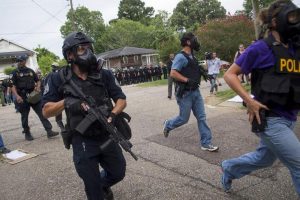
Poverty is real for many in Baton Rouge. Teachers, firefighters, and law enforcement are tremendously underpaid.
However, the problem in Baton Rouge is that the socioeconomically challenged have the same hard luck stories, whether white or black, and they cannot appreciate that their lives mirror each other.
Since I know the true story of Baton Rouge’s underbelly I cannot help but cringe and weep when I see recent images from my hometown. They are cringe-worthy images because what is at the root of Baton Rouge’s ailments is economics, not what is being told.
Even after discovering through life experiences that we are all more alike than not, some are reared to believe they are very different. That harsh reality for some is too raw, too real.
All of Baton Rouge, all of Louisiana, was hoodwinked by former Governor Bobby Jindal, but where was her protest then? Her shock, her anger, her commentary? It is also particularly frustrating that Mayor Holden has remained silent and opted to lobby in Washington for a project that offers little, if no, benefit to the community at large. Where is the leadership? How are they all absent in the wake of this?
I hope my final thoughts and prayers bring encouragement to Baton Rouge.
Early in my legal career, when I was General Counsel of the East Baton Rouge Parish Housing Authority, I worked closely with the Baton Rouge Police Department (BRPD) and my community-policing program was a success in controlling criminal activity, building trust, and rapport with tenants.
Properly training law enforcement officers to build ties with and work closely with members of their communities is critical if we want officers and citizens have a greater respect for each other.
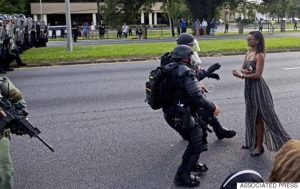
July 9, 2016, a protester is grabbed by police officers after she refused to leave the motorway in front of the the Baton Rouge Police Department Headquarters.
I love Baton Rouge – she is home – so I am always hopeful. I know that it has always been a catalyst of change. Baton Rouge has encouraged change all around her.
However, just because some things are different does not mean anything has changed. Baton Rouge has largely remained the city of her troubled past and that saddens me.
Yet I know positive change is always possible where truth exists. Change is a necessary element of growth. If we change, we grow. If we do not change, we begin to stagnate and decay. That is the simple truth about change.
And we should all be reminded of Dr. Martin Luther King, Jr.’s 1963 “Letter from a Birmingham Jail” where he said, “Injustice anywhere is a threat to justice everywhere.”
Therefore, my prayer for my hometown and communities everywhere is that they are bold, brave, courageous, and humble. I pray that they always remember to have empathy in your hearts.








